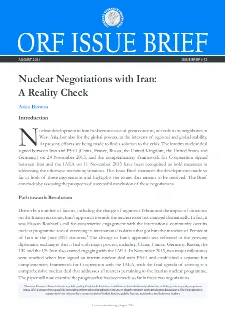Nuclear development in Iran has been an issue of great concern, not only to its neighbours in West Asia, but also for the global powers, in the interests of regional and global stability. At present, efforts are being made to find a solution to the crisis. The interim nuclear deal signed between Iran and P5+1 (China, France, Russia, the United Kingdom, the United States and Germany) on 24 November 2013, and the complementary Framework for Cooperation signed between Iran and the IAEA on 11 November 2013 have been recognised as bold measures in addressing the otherwise worsening situation.
Driven by a number of factors, including the change of regime in Tehran and the impact of sanctions on the Iranian economy, Iran’s approach towards the nuclear issue has changed dramatically. In fact, it was Hassan Rouhani’s call for constructive engagement with the international community over its nuclear programme and of reversing its international isolation that got him the mandate of President of Iran in the June 2013 elections. The change in Iran’s approach was reflected in the growing diplomatic exchanges that it had with major powers, including China, France, Germany, Russia, the UK and the US. Iran also started engaging with the IAEA. In November 2013, two major milestones were reached when Iran signed an interim nuclear deal with P5+1 and established a separate but complementary Framework for Cooperation with the IAEA, with the final agenda of arriving at a comprehensive nuclear deal that addresses all matters pertaining to the Iranian nuclear programme.
This Issue Brief examines the developments made so far in both of these negotiations and highlights the issues that remain to be resolved. The Brief concludes by assessing the prospects of successful conclusion of these negotiations.
The views expressed above belong to the author(s). ORF research and analyses now available on Telegram! Click here to access our curated content — blogs, longforms and interviews.

 PDF Download
PDF Download



 PREV
PREV


